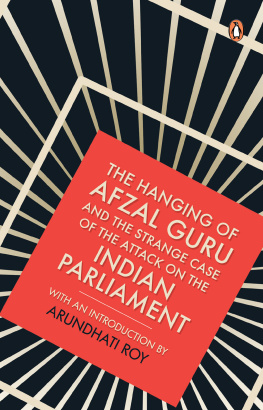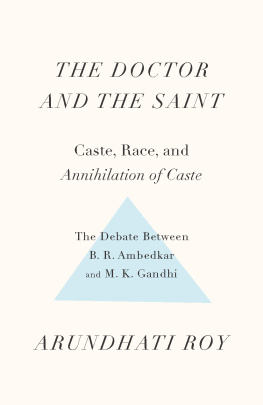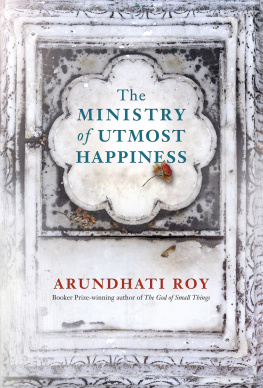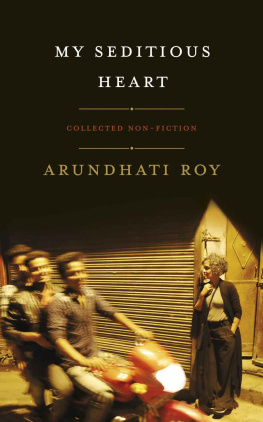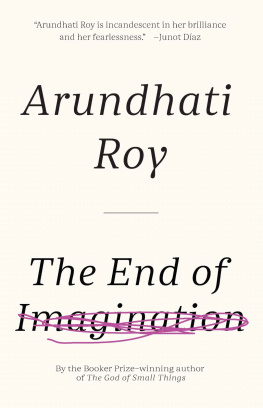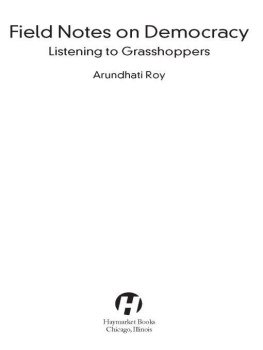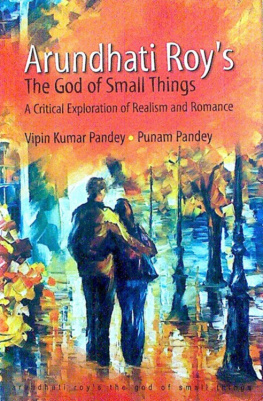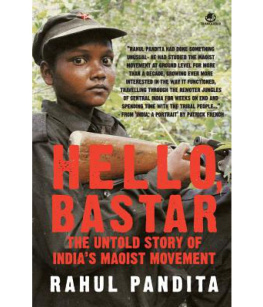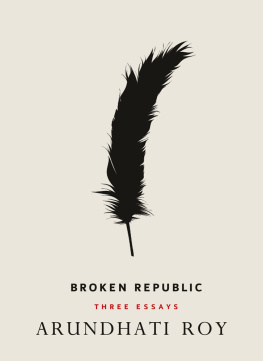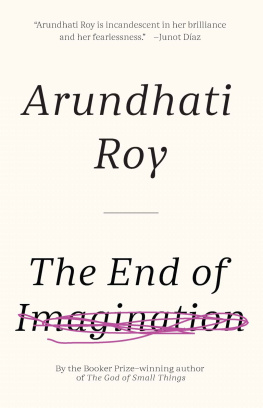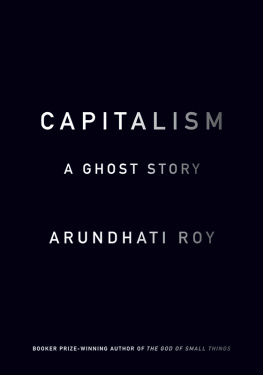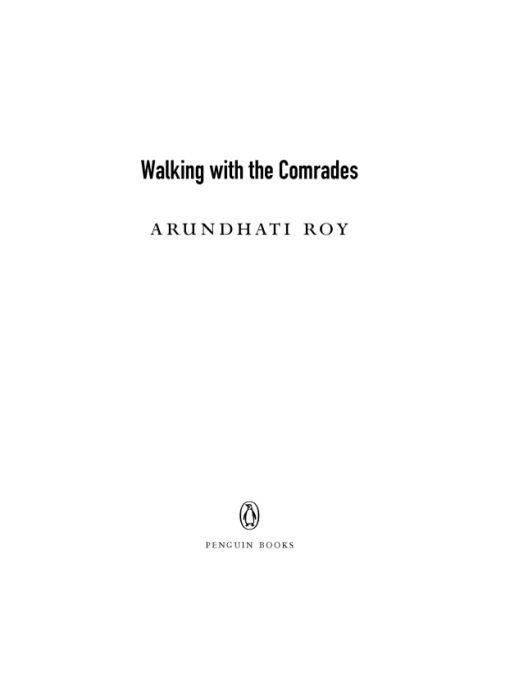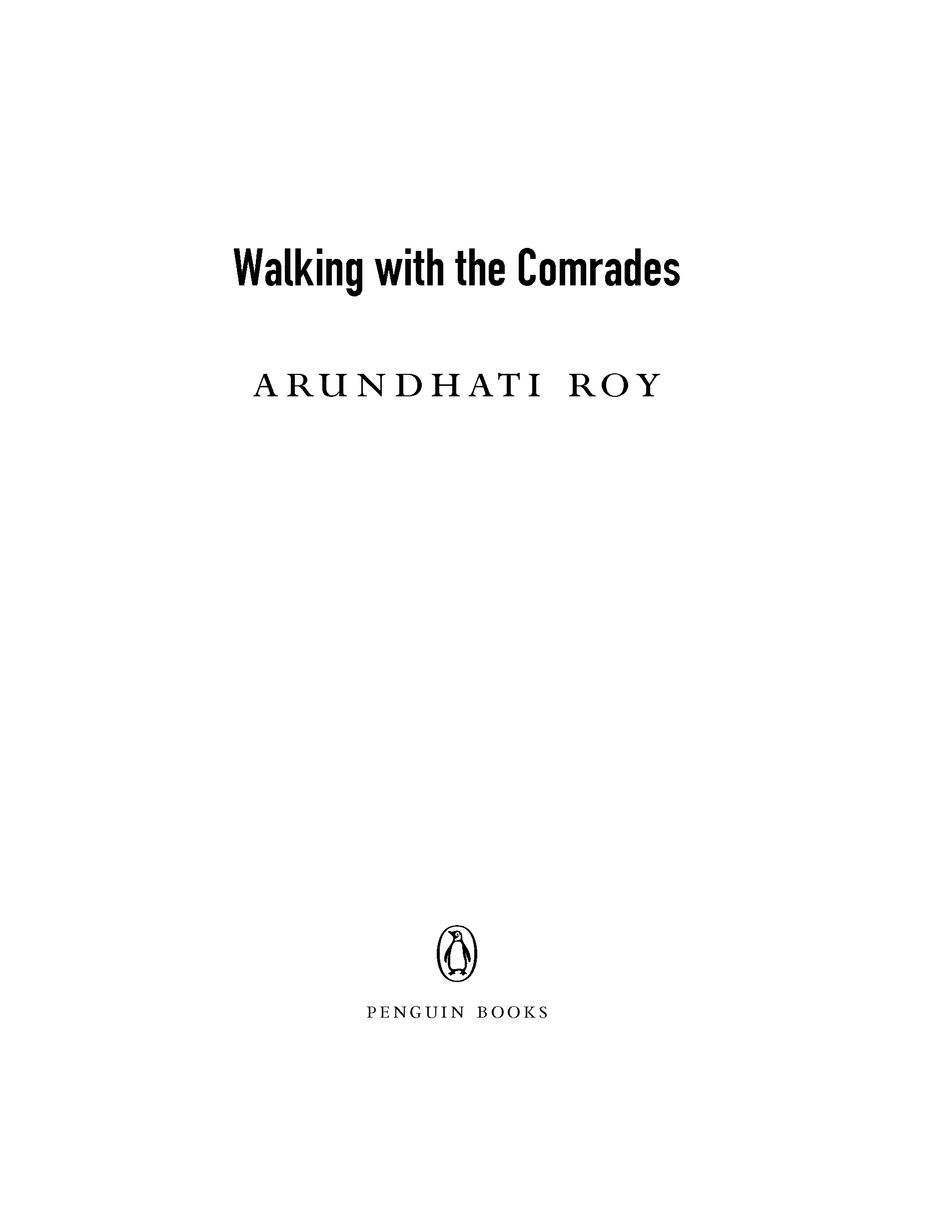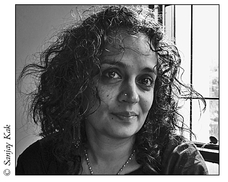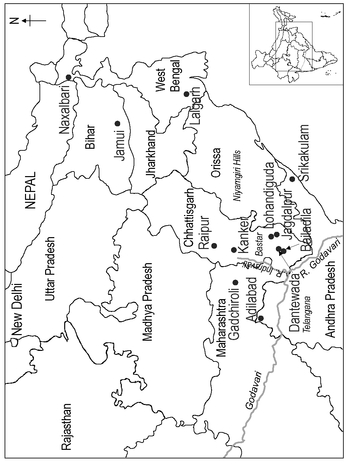Table of Contents
PENGUIN BOOKS
WALKING WITH THE COMRADES
ARUNDHATI ROY is the author of The God of Small Things, which won the prestigious Man Booker Prize in 1997. Since then she has produced numerous works of political commentary and investigative journalism including An Ordinary Persons Guide to Empire and Field Notes on Democracy. Roy is the recipient of the 2002 Lannan Foundation Cultural Freedom Prize. She lives in New Delhi.
Your blood asks, how were the wealthy
And the law interwoven? With what
sulfurous iron fabric? How did the
poor keep falling into the tribunals?
PABLO NERUDA, The Judges
INTRODUCTION
The President Took the Salute
The Minister says that for Indias sake, people should leave their villages and move to the cities. Hes a Harvard man. He wants speed. And numbers. Five hundred million migrants, he thinks, would make a good business model.
Not everybody likes the idea of their cities filling up with the poor. A judge in Mumbai called slum dwellers pickpockets of urban land. Another said, while ordering the bulldozing of unauthorized colonies, that people who couldnt afford it shouldnt live in cities.
When those who had been evicted went back to where they came from, they found their villages had disappeared under great dams and quarries. Their homes were occupied by hunger, and policemen. The forests were filling up with armed guerrillas. War had migrated too. From the edges of India, in Kashmir, Manipur, Nagaland, to its heart. So the people returned to the crowded city streets and pavements. They crammed into hovels on dusty construction sites, wondering which corner of this huge country was meant for them.
The Minister said that migrants to cities were mostly criminals and carried a kind of behaviour which is unacceptable to modern cities. The middle class admired him for his forthrightness, for having the courage to call a spade a spade. The Minister said he would set up more police stations, recruit more policemen and put more police vehicles on the road to improve law and order.
To make Delhi a world-class city for the 2010 Commonwealth Games, laws were passed that made the poor vanish, like laundry stains. Street vendors disappeared, rickshaw pullers lost their licences, small shops and businesses were shut down. Beggars were rounded up, tried by mobile magistrates in mobile courts and dropped outside the city limits. The slums that remained were screened off, with vinyl billboards that said DELHIciously Yours.
New kinds of policemen patrolled the streets, better armed, better dressed and trained not to scratch their privates in public, no matter how grave the provocation. There were cameras everywhere, recording everything.
Two young criminals carrying a kind of behaviour which was unacceptable to modern cities escaped the police dragnet, and approached a woman sandwiched between her sunglasses and the leather seats of her shiny car at a traffic crossing. Shamelessly they demanded money. The woman was rich and kind. The criminals heads were no higher than her car window. Their names were Rukmini and Kamli. Or maybe Mehrunissa and Shahbano. (Who cares?) The woman gave them money and some motherly advice. Ten rupees to Kamli (or Shahbano). Share it, she told them, and sped away when the lights changed.
Rukmini and Kamli (or Mehrunissa and Shahbano) tore into each other like gladiators, like lifers in a prison yard. Each sleek car that flashed past them, and almost crushed them, carried the reflection of their battle, their fight to the finish, on its shining door.
Eventually both girls disappeared without a trace, like thousands of children do in Delhi.
The Games were a success.
Two months later, on the sixty-second anniversary of India becoming a Republic, the armed forces showcased their new weapons at the Republic Day parade. Russian multi-barrel rocket launchers, combat aircraft, light helicopters and underwater weapons for the navy. The new T-90 battle tank was called Bhishma. (The older one was Arjun.) Varunastra was the name of the latest heavyweight torpedo, and Mareech was a decoy system to seduce incoming torpedoes. (Hanuman and Vajra are the names painted on the armoured vehicles that patrol Kashmirs frozen streets.) That the names were drawn from Hindu epics was just a coincidence. If India is a Hindu nation, its only an accident.
Dare Devils from the Armys Corps of Signals rode motorcycles in a rocket formation. Then they formed a cluster of flying birds and finally a human pyramid.
Overhead Sukhoi fighter jets made a trishul, a trident in the sky. Each jet cost more than a billion rupees. Four billion then, for Shivas Trident.
The thrilled crowd turned its face up to the weak, winter sun and applauded. High in the sky, the winking silver sides of the jets carried the reflection of Rukminis and Kamlis (or Mehrunissas and Shahbanos) fight to the death.
The army band played the national anthem. The President drew the pallu of her sari over her head and took the salute.
February 2011
Map not to scale
Mr Chidambarams War
The low, flat-topped hills of south Orissa have been home to the Dongria Kondh long before there was a country called India or a state called Orissa. The hills watched over the Kondh. The Kondh watched over the hills and worshipped them as living deities. Now these hills have been sold for the bauxite they contain. For the Kondh its as though god has been sold. They ask how much god would go for if the god were Ram or Allah or Jesus Christ.
Perhaps the Kondh are supposed to be grateful that their Niyamgiri hill, home to their Niyam Raja, God of Universal Law, has been sold to a company with a name like Vedanta (the branch of Hindu philosophy that teaches the Ultimate Nature of Knowledge). Its one of the biggest mining corporations in the world and is owned by Anil Agarwal, the Indian billionaire who lives in London in a mansion that once belonged to the Shah of Iran.Vedanta is only one of the many multinational corporations closing in on Orissa.
If the flat-topped hills are destroyed, the forests that clothe them will be destroyed too. So will the rivers and streams that flow out of them and irrigate the plains below. So will the Dongria Kondh. So will the hundreds of thousands of tribal people who live in the forested heart of India, whose homeland is similarly under attack.
In our smoky, crowded cities, some people say, So what? Someone has to pay the price of progress. Some even say, Lets face it, these are people whose time has come. Look at any developed country, Europe, the United States, Australiathey all have a past. Indeed they do. So why shouldnt we?


